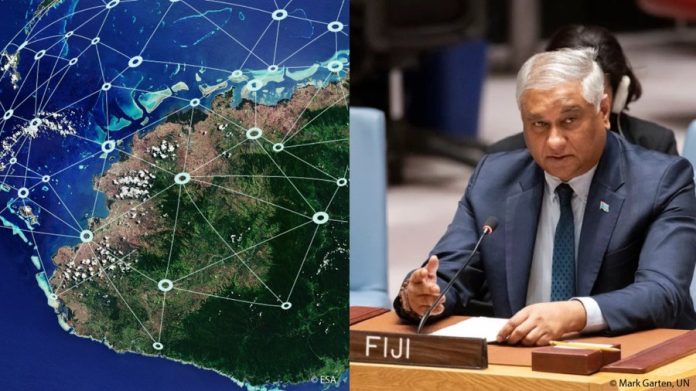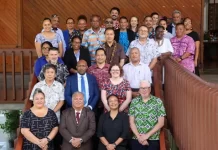The digitalFIJI strategy aims to develop a $1bn (US$500 million) digital economy in Fiji by 2030 – matching the size of the country’s tourism industry.
In this exclusive interview, Satyendra Prasad, Permanent Representative of Fiji to the United Nations, highlights why digital is not optional for SIDS.
In what ways can digital catalyse the last two years of the SAMOA Pathway?
We have two short years remaining of the SAMOA Pathway. We have only eight years to achieve the SDGs. We probably have less than eight years to adapt our economies and societies for an above 1.5°C future. The stakes could not be higher, and digitalisation must be at the centre stage of these efforts. Fortunately, the silver lining of the COVID pandemic has been a rapid uptake and recognition of digital as a central tool for modernising government, accelerating public service development and inclusion, and driving transformation across industry and government.
In Fiji we are realising the potential that digital brings. Our digitalFIJI strategy is strengthening our digital foundations to deliver development results across the board. Our Ministry for Health and Medical Services has worked in tandem with the University of the South Pacific to develop the My Kana mobile app to address high rates of non-communicable diseases. We are tackling illegal tuna fishing by registering catch on the blockchain, offering consumers the ability to track the ‘story’ of their store-bought tuna: when and where it was caught, by whom, and by what method.
Across the Pacific we are seeing a diversity of innovative applications of technology to solve pressing development challenges during normal times; following disasters; and in the context of climate catastrophes. In Vanuatu, drones are being used to improve delivery of vaccines to children in remote islands, overcoming logistical barriers and high costs of delivery. There is no reason why this technology cannot be extended to provide a range of services to communities living across thousands of islands across the Blue Pacific – a region that covers around 15% of the surface of the planet. In Tuvalu, LiDAR technology is helping to monitor changes in sea level and to better plan for climate adaptation. Save Tuvalu and you save the world. This is the frontline of the frontline. Digital technologies must become both enablers and drivers for adaptation.
How can we ensure that young people are drivers of digital transformation across SIDS?
Young people are at the heart of digital transformation across the Blue Pacific. The Blue Pacific is heavily investing in education – with many countries, including Fiji, nearing 100% literacy rates. Young people are first movers in adopting technologies; in innovating. They are driving innovations because there are so many problems that are ready and waiting for technology solutions. How can a young person in a capital city transfer money to her parents living on an island where there are no banks, or post offices? How can a young person send money to relatives on distant islands following a volcanic explosion or cyclone – quickly and with confidence?
Young people are not afraid to test solutions; to adapt technologies. They are excited by emerging technologies. They are connected to the global world of ideas like never before, so they also know and see what being left behind could mean. Because of this, they are imagining and driving a different future. Do not forget the Pacific is Blue – but even more than that, it is young; youthful and brimming with innovation. Sadly, though, many of our youth in SIDS depart to study abroad and do not return home. We must ensure that they have opportunities to participate and indeed drive digital transformation. We must take measures to create innovation ecosystems that expand digital skills and incubate and support start-ups. Digitalisation offers the best prospects in a generation for reversing the brain drain. Digitalisation offers the best prospects for Fiji and the Pacific to attract international investors and companies. Fiji is already committed to developing a $1 billion (US$500 million) dollar digital economy by 2030 – an industry that can be as large as, and compete with, its world-class tourism industry.
But we also know that not all young people are digitally-savvy. Opportunities in the future job market will be severely constrained for young people who lack basic or intermediate-level digital skills. We must ensure that digital skills training is incorporated into our schools at all levels and that all people have access to affordable devices and reliable connectivity to give all of our children a chance to thrive in this fast-changing job market. This is where digital partnerships with our development partners and the private sector must come into play.
What role can – and should – government be playing to make the Fourth Industrial Revolution useful and relevant for SIDS?
With the private sector driving much of the innovation, governments are often seen as lagging behind in the digital space. Governments must also be driving and harnessing technology wherever they can. From shaping a transition to green shipping, to building national ID systems, to delivering bundles of services, and deepening financial inclusion – especially for women. SIDS governments cannot sit on the sidelines.
We need to be part of shaping the Fourth Industrial Revolution. For example, blockchain technology is shifting traditional and institutional power dynamics. As SIDS we can be at the forefront of this shift, taking advantage of our small size to be a testbed and incubator – and leading the rollout of new and emerging technologies. Governments can provide fiscal and other opportunities to attract global finance and tech companies, often more easily than larger countries. Governments can incentivise innovation; and should be collaborating with the private sector to develop pro-innovation and pro-citizen regulatory frameworks.
With this last point in mind, governments also have a responsibility to ensure the benefits of the digital transformation significantly outweigh the risks. Governments must protect citizens, provide sufficient safeguards and enforcement against cybercrimes, and protect intellectual property rights and data. These require new capacities and capabilities within and beyond government. But, they will all also create new jobs and opportunities as well. Governments – and, indeed, civil society – have an important role to play in supporting citizens from an early age with building digital skills, providing affordable access to devices and connectivity, and building a digitally-aware and digitally-savvy citizenry. I hope that the UNDP will be able to work with Pacific governments on this journey.
SOURCE: UNSIDS/PACNEWS















